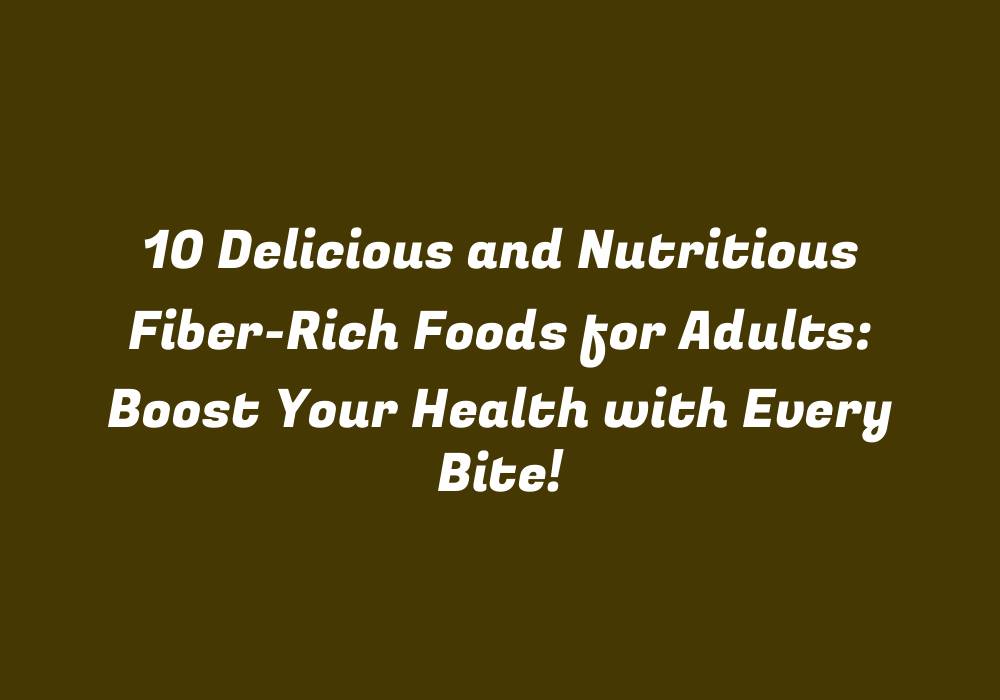Introduction to Fiber-Rich Foods for Adults
Fiber is an essential nutrient that plays a vital role in maintaining overall health. As adults grow older, it becomes increasingly important to consume the right food items that not only provide the necessary energy but also enhance our wellbeing. Incorporating fiber-rich foods into your daily diet can help improve digestion, reduce cholesterol levels, and manage weight. This article highlights 10 delicious and nutritious fiber-rich options for adults to boost their health with every bite.
1. Oats
Oats are widely recognized as a staple breakfast food, known for its high fiber content. A half cup serving of cooked oatmeal contains approximately 4 grams of dietary fiber. It is also an excellent source of protein and vital minerals like iron, magnesium, and phosphorus. Oats are available in various forms such as oat bran, steel-cut oats, or rolled oats. Consuming oats regularly can promote a healthy heart and may even help regulate blood sugar levels.
2. Beans
Beans, specifically black beans, pinto beans, and lentils, are among the best fiber sources for adults. A cup of cooked beans offers around 15 grams of dietary fiber, which is almost double the recommended daily intake. These legumes are also rich in protein, antioxidants, and various vitamins and minerals that aid in maintaining a balanced diet. They can be easily added to salads, soups, tacos, or simply enjoyed as a side dish.
3. Avocados
Avocados, although they are often associated with their heart-healthy fats, are surprisingly high in fiber (approximately 10 grams per avocado). They also provide a good amount of potassium and vitamins C and E. These versatile fruits can be used to make smoothies, guacamole, or even incorporated into savory dishes as a healthier alternative for creamy sauces. Consuming avocados regularly may aid in digestion while keeping you full longer due to their fiber content.
4. Berries
Berries, such as raspberries, blueberries, and strawberries, are not only delicious but also a nutritious source of dietary fiber. They contain various antioxidants that contribute to a healthier heart and may even help lower the risk of cancer. A cup of berries provides around 8 grams of fiber, which can be easily added to your daily diet by sprinkling them on cereal or yogurt, creating smoothies, or as standalone snacks.
5. Whole Grains
Whole grains, including brown rice, quinoa, and whole wheat pasta, are rich in dietary fiber and other essential nutrients such as B vitamins, iron, and magnesium. Incorporating these foods into your meals can significantly boost fiber intake while reducing the risk of chronic diseases. Cook them for a more filling and satisfying meal or use them to create healthier versions of pasta dishes, bread, and side items.
6. Seeds and Nuts
Seeds and nuts, such as chia seeds, flaxseeds, pumpkin seeds, almonds, or walnuts, are excellent sources of dietary fiber. They also provide essential fatty acids, proteins, and various vitamins and minerals that contribute to overall health. Sprinkle them on salads, yogurt, oatmeal, smoothies, or simply eat them as a snack to increase your daily intake of healthy fats, fiber, and nutrients.
7. Dark Leafy Greens
Dark leafy greens, including kale, spinach, and Swiss chard, are packed with dietary fiber as well as vitamins A and C, and essential minerals like iron and calcium. These vegetables can be incorporated into various dishes such as salads, stir-fries, soups, or simply added to smoothies for a nutritious boost. Regular consumption of these greens may help maintain bone health, support digestion, and even enhance eye health.
8. Sweet Potatoes
Sweet potatoes, while known for their high content of vitamin A and antioxidants, also provide a decent amount of dietary fiber (approximately 3 grams per medium-sized potato). They are versatile ingredients that can be roasted, baked, or mashed as a side dish. Incorporating sweet potatoes into your diet can contribute to improved blood sugar regulation and enhanced immune function.
9. Dried Fruits
Dried fruits, such as raisins, dried apricots, or dates, are excellent sources of fiber (approximately 4 grams per half cup). They also contain various vitamins and minerals that offer numerous health benefits. Use them as a quick snack to curb hunger between meals or incorporate into your morning oatmeal for an added nutritional boost.
10. Mushrooms
Mushrooms, particularly shiitake and maitake varieties, are an often overlooked source of dietary fiber. They also contain essential minerals like selenium, copper, and potassium that play a vital role in maintaining overall health. Incorporating mushrooms into your meals can provide a tasty addition to soups, stir-fries, or even pasta dishes while enhancing the nutritional value.
Conclusion
Adding fiber-rich foods to your diet offers numerous health benefits and can significantly enhance wellbeing as we age. By incorporating a variety of these options into daily meals, adults can enjoy delicious and nutritious dishes while boosting their fiber intake and overall health. Embracing a balanced and diverse diet will ultimately lead to better digestion, heart health, and improved energy levels throughout the day.
References
- Foods High in Fiber
- The Health Benefits of Oats and Why You Should Eat Them
- The Benefits of Black Beans: Nutrition, Health and More
- Health Benefits of Avocados
- Fruits and Vegetables: The Key to a Healthy Diet
- Whole Grains 101: The Ultimate Guide to Their Health Benefits
- Why Nuts Are Good for You: Health Benefits and Nutritional Value
- Leafy Green Vegetables: Benefits, Types, and How to Prepare Them
- 5 Health Benefits of Sweet Potatoes
- Top Sources of Fiber: How Much You Need and Where to Find It
- Mushrooms and Nutrition: Types, Benefits, and How to Incorporate Them into Your Diet
- The Importance of Fiber for Health: Types, Sources, and Benefits
